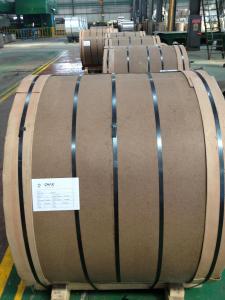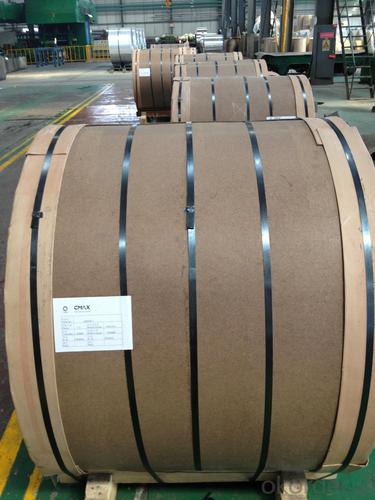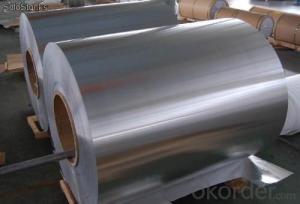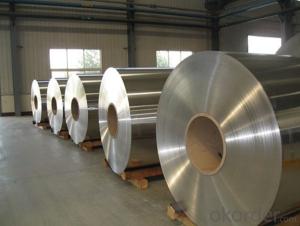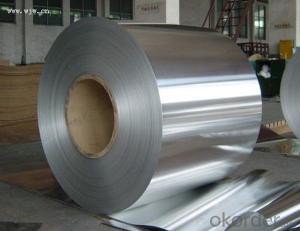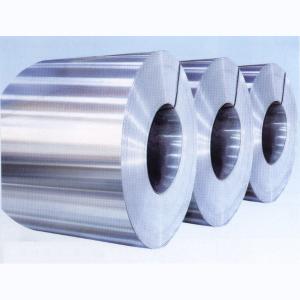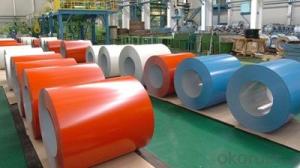Alsco Aluminum Coil - Mill Finished Aluminum Coils Hot Rolled AA1100
- Loading Port:
- China Main Port
- Payment Terms:
- TT or LC
- Min Order Qty:
- -
- Supply Capability:
- -
OKorder Service Pledge
OKorder Financial Service
You Might Also Like
1.Structure of Mill finished Aluminium Coils Description
Mill Finished Aluminium Strip in Coil is one semi-finished aluminium material. This strip can be rolled down to aluminium coil,sheet,circle ect. The alloy AA1100 is widly used in building, industry ect. Its weight is much lower than steel. So many customers choosed aluminium material instead of steel.
2. Main features of Mill Finished Aluminium Coils
a.Competitive price---We have our own mills and can produce mill finished aluminium coils, so we can control the production cost better.
b.Professional after-sale service---We have more than 15 years exportation experience and you need not worry about the exporation problems.
c.Fast delivery time---We can control the delivery time within 35 days.
3. Image
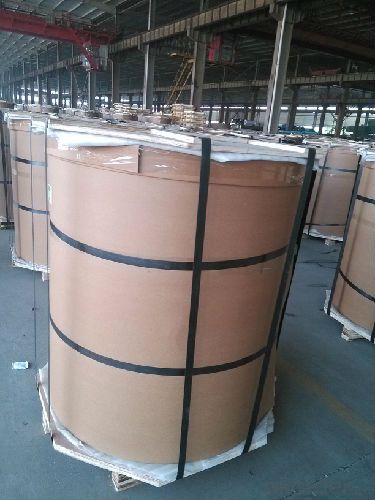
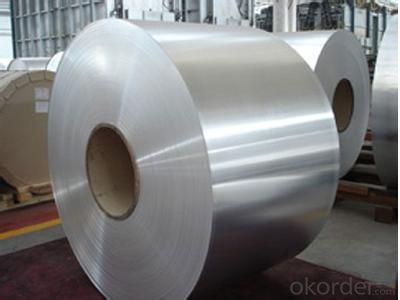
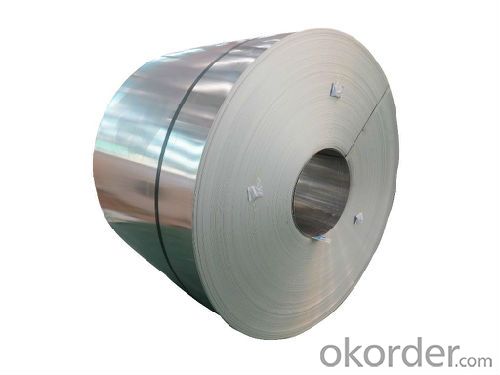
4. Products Specification
| Alloy | Temper | Thickness Tolerance | Coil Package | Coil OD |
| AA1100 | H18 | 0.02MM | Eye to sky | 1500mm |
5.FAQ
What is the quality standard?
---Usually our standard is GB3880-2006
What is the largest width?
---It is 2300mm
What is the MOQ?
---Usually we can accept 80 tons.
- Q: How much of a difference does it make? I recently bought a 700 SPS tactical in 308. It has the Houge pillar bedding stock. I love the tacky feeling rubber outside, but noticed that the fore end of the stock flexes a bit (enough to touch the free floating barrel.) I was wondering if the aluminum bedding block version of the same stock (or any other aluminum bedding stock) will be better? I know they cost more, and the experts claim they're great, but will an amateur shooter notice the difference? I like to target shoot, typically around 200 yards. BTW, I was also considering the Bell and Carlson medalist.
- Vote for the Aluminum yet somewhat might like a silver lined one bless by using a Catholic priest that emits holy water. That way in case they are additionally a vampire you nailed them.
- Q: my text says aluminium does not corrode much as a passive aluminium oxide layer is formed on it.Well other metals such as sodium adn potassium also form oxides. Why dont their oxides prevent further oxidation ?
- sodium oxide and potassium oxide are water soluble aluminium oxide is not water soluble. the layer formed of oxide on the aluminium surface is coherent and adherent with no pores and stuck to the metal surface. the layer is also passive to most acids and alkalies except HCl and anti passive ions if present. sodium oxide and potassium oxide dissolve in any aqueous medium forming the corresponding alkalies NaOH and KOH leaving the fresh metal surface exposed to more corrosion. also the reaction of Na and K with aqueous media like water and acids is quite vigorous and fast unlike aluminium which is mu less reactive
- Q: What role does the powdered aluminum play in this reaction?
- Aluminum is what burns or combines with oxygen. Learn How, you have it backwards. Iron oxide is the oxidizer.
- Q: What are the common recycling methods for aluminum coils?
- The common recycling methods for aluminum coils include sorting them based on their alloy composition, melting them down to remove any impurities, and then reusing the molten aluminum to make new coils or other aluminum products.
- Q: What are the different forming processes for aluminum coils?
- Some of the different forming processes for aluminum coils include rolling, coiling, slitting, and annealing.
- Q: How are aluminum coils protected against oxidation?
- Aluminum coils are protected against oxidation through a process called aluminum coil coating. This involves applying a protective coating or layer onto the surface of the coil to prevent direct contact with oxygen and other environmental elements that may cause oxidation. The protective coating acts as a barrier, shielding the aluminum from moisture, air, and other corrosive substances. There are different types of coatings used for aluminum coil protection. One common method is the application of a clear or colored organic coating, such as polyester or polyvinylidene fluoride (PVDF). These coatings not only provide a barrier against oxidation but also enhance the durability and aesthetic appeal of the coils. Another method is anodizing, which involves immersing the aluminum coil in an electrolytic solution and passing an electric current through it. This process forms a layer of aluminum oxide on the surface of the coil, which acts as a natural protective barrier against oxidation. Anodized aluminum coils are known for their excellent corrosion resistance and can be further enhanced with additional coating layers. Additionally, aluminum coils can be protected through the use of chemical conversion coatings. These coatings, such as chromate or phosphoric acid-based coatings, chemically react with the aluminum surface, forming a protective layer that prevents oxidation. Overall, the protection of aluminum coils against oxidation is crucial to ensure their longevity and performance. By applying various coatings or undergoing anodizing or chemical conversion processes, the coils can effectively resist oxidation and maintain their integrity even in harsh environments.
- Q: Can aluminum coils be used in high-pressure or high-temperature environments?
- No, aluminum coils are not suitable for high-pressure or high-temperature environments as they have lower strength and melting points compared to other materials.
- Q: What is the fatigue strength of aluminum coils?
- Various factors, including the specific alloy used, the manufacturing process, and the application, can cause the fatigue strength of aluminum coils to vary. In comparison to other materials, aluminum alloys generally possess good fatigue strength, making them appropriate for a broad range of applications that necessitate resistance to cyclic loading and fatigue. Due to their lightweight nature and excellent corrosion resistance, aluminum coils find common use in industries such as automotive, aerospace, and electrical. Fatigue testing is typically employed to determine their fatigue strength, involving subjecting the material to repeated cycles of stress until failure occurs. Aluminum alloys in coil form are engineered to endure cyclic loading without experiencing significant damage or failure. The fatigue strength of aluminum coils can be influenced by factors like alloy composition, heat treatment, and surface finish. Generally, higher strength aluminum alloys, such as those belonging to the 7000 series, exhibit greater fatigue strength compared to lower strength alloys like the 1000 or 3000 series. To accurately ascertain the specific fatigue strength of aluminum coils, it is vital to consider the intended application, expected stress levels during operation, and desired service life. Predictions regarding fatigue life can be made using various models and testing methods, such as S-N curves (stress amplitude vs. number of cycles to failure). In summary, aluminum coils generally possess good fatigue strength, rendering them a suitable choice for applications requiring resistance to cyclic loading and fatigue. However, the specific fatigue strength of aluminum coils can vary depending on factors such as alloy composition, heat treatment, and surface finish. To accurately determine the fatigue strength for a specific application, it is advisable to consult technical specifications or conduct fatigue testing.
- Q: Can aluminum coils be used in the production of aircraft fuel tanks?
- Aluminum coils, with their lightweight and durable nature, find application in the creation of aircraft fuel tanks. They are commonly employed in the aerospace industry due to their impressive strength-to-weight ratio. Furthermore, their corrosion-resistant properties make them an ideal choice for fuel tanks, as they can withstand the harsh conditions and chemicals present in aviation fuel. The utilization of aluminum coils enables efficient manufacturing processes, as they can be easily shaped and welded into the desired tank form. Moreover, aluminum possesses excellent thermal conductivity, aiding in the dissipation of heat generated during flight and preventing fuel overheating. In conclusion, aluminum coils are a fitting and extensively utilized material in the production of aircraft fuel tanks.
- Q: Are aluminum coils suitable for high-pressure applications?
- No, aluminum coils are not suitable for high-pressure applications.
Send your message to us
Alsco Aluminum Coil - Mill Finished Aluminum Coils Hot Rolled AA1100
- Loading Port:
- China Main Port
- Payment Terms:
- TT or LC
- Min Order Qty:
- -
- Supply Capability:
- -
OKorder Service Pledge
OKorder Financial Service
Similar products
Hot products
Hot Searches
Related keywords
